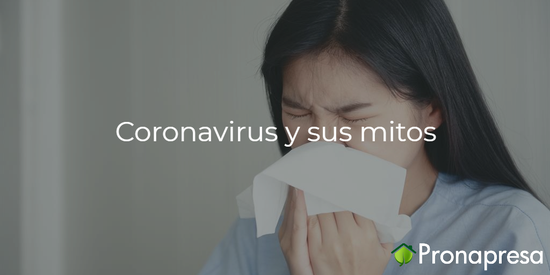
Along with COVID-19 have come a whole series of myths about the coronavirus. Social networks, in particular, are full of fake news, mainly regarding possible cures for the disease, or the scope and dangers of the pandemic.
What happens with the pandemic will depend, to a large extent, on our ability to confront it intelligently. To achieve this, it is best to obtain quality information and follow the recommendations made by health authorities. The following are some of those myths about coronavirus that must be banished.
The coronavirus is one of the most serious diseases in history
- Due to the extensive news coverage of this disease, the idea has been promoted that this is the most serious pandemic in history, when this is not the case. What makes the coronavirus dangerous is its high contagion capacity, but not its lethality.
- Another factor that has triggered alarms is the fact that it is a new virus and, therefore, unknown. Since not much is known about it, it is not possible to predict how it will behave. As time passes, data that we do not yet know could be found.
- At the moment, the mortality rate from this disease is approximately 3.2%. This means that, for every hundred people infected, three die. Although any disease that leads to death should be a cause for concern, in this case only a minority has fatal consequences.
It's little more than a common flu
- At the other extreme of the fatalists are those who minimize the danger of the pandemic. It is true that in 80% of cases this disease only generates mild symptoms. But it is also true that it is a pathology that affects the lungs, which are vital organs.
- Likewise, it is still not clear how the virus behaves, nor can it be predicted with certainty whether it will present changes or not. Simply put, we are facing a threat that we do not fully understand. In a situation like this, the only smart thing is to be very cautious and not underestimate the risks.
- Additionally, as already noted, this particular virus is very contagious. If the number of infections increases, the number of deaths will also increase, since the risk of it reaching the most vulnerable people, such as very young children, the elderly and those who have a weakened immune system, increases.
Home remedies and myths about coronavirus
- Several of the myths about the coronavirus have to do with the use of some home remedies that could stop or cure the disease. In this regard, it must be said that there is no scientific evidence on the effectiveness of such remedies in this case.
- It has been said, for example, that garlic is capable of stopping infection. Although the World Health Organization (WHO) has indicated that this vegetable has some antimicrobial properties, the truth is that nothing leads to believe that it is effective against the coronavirus. The same can be said for colloidal silver and the miracle mineral supplements that some want to make fashionable.
- At the moment there are no drugs, much less home remedies to treat coronavirus. It is worth saying that it is very important to avoid self-medication, as this could mask the symptoms of COVID-19 and generate greater health risks.
Hygiene is not a myth about coronavirus
- Frequently washing your hands and applying antibacterial gel are measures to reduce the risk of contagion. It is estimated that this practice reduces the possibility of acquiring the virus by up to 50%. However, the most effective thing is to minimize contact with other people and quarantine if you suspect you have been exposed.
- It is not true that homemade disinfectant should be applied to the hands to increase the chances of avoiding contagion. It is also not true that the face mask, or face mask, prevents the entry of the virus. COVID-19 only remains on objects for a few hours, so it is difficult to spread that way. However, it is always a good idea to wash your hands after touching objects that have passed through many hands.
Sharing is health! :) , Follow us on our social networks.
PRONAPRESA
"Because prevention is better than cure"





















































